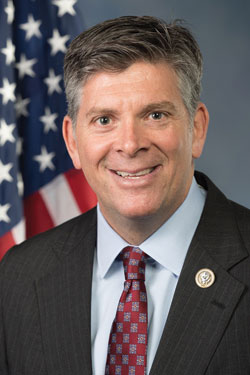America’s economy is surging, and the number of available jobs is at an all-time high. Since passing landmark tax reform, unemployment has hit the lowest level since 1969, paychecks have risen, 5.2 million people have moved off food stamp dependency, and more people are working than ever before. The hot labor market, however, presents employers with unique challenges.
Bridging the Skills Gap
In July, the Bureau of Labor Statistics announced there are 7.3 million unfilled jobs in the United States, marking the 15th straight month in which the number of job openings exceeded the number of job seekers. But job seekers often lack the necessary education to fill those jobs, and we have an obligation to bridge this growing skills gap.
As I travel around Illinois’ 18th District, one of the biggest concerns I hear from business owners is the lack of skilled individuals to fill openings—particularly in middle-skill jobs, which require more than a high school education but less than a four-year degree. According to the National Skills Coalition, middle-skill jobs account for 53 percent of the labor market, but only 43 percent of the labor force are trained to perform these jobs.
Society today might tell you that a four-year degree is required to find a good-paying job, but this discourages students from pursuing good-paying middle-skill jobs. We need more welders, truck drivers, technicians, nurses and machinists. To address the skills gap, workforce development must be a priority to ensure all young people have a pathway into the labor market.
In Congress, I have supported initiatives to expand resources for the community college system and bolster apprenticeship programs across Illinois. In February I introduced the Supporting Work Through Apprenticeships Act, which will ensure apprenticeship programs are treated like other training programs, such as vocational education training and job readiness assistance. Just last year, Congress passed the Strengthen Career and Technical Education for the 21st Century Act, which supports innovative learning opportunities, empowers local community colleges and builds partnerships in the community.
Peoria Leads the Way
Last year, nearly two-thirds of graduates from Illinois community colleges earned a career technical education degree. While more work needs to be done on this across the country, right here in Peoria, Illinois Central College is leading the way. They’ve partnered with local businesses to provide students with apprenticeship programs that will set them up for success in the workforce. Dr. Sheila Quirk-Bailey, ICC president, is championing this effort.
As technology continues to progress, one of the biggest challenges we face is bridging the skills gap. We live in an age of automation, and with each new year, the skills required for jobs change more rapidly. We need to expand opportunities for students looking to enter the labor force, so workers of all backgrounds can earn a living. Prioritizing workforce development and career technical education—as ICC has—will put future generations in a position to succeed for years to come. PM
Darin LaHood represents Illinois’ 18th Congressional District in Washington, DC.




